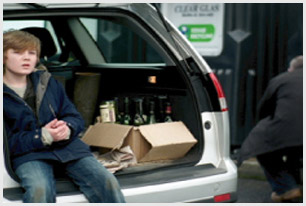Concerned parents

Concerned about a young person's drinking?
If you are a parent, family member or guardian who is concerned about a young person’s pattern of alcohol use, this section is for you. Young people’s drinking is a cause of concern to many parents. The teenage years of adolescence are when a lot of development, both physical and psychological, takes place. Some of these changes are visible, such as their growth, their height. Others are invisible, such as developments in their brain, their emotions and their psychology. The presence of alcohol during these years may impair development, especially if it is taken in excess.
Even moderate drinking in adolescence has its risks. A young person, unused to the effects of alcohol, may get sick, take unnecessary risks, have an accident, miss out on work, school or sport, or become a burden to their friends.
Heavier drinking in adolescence increases the risk of later problems of dependence on alcohol or other substances. Postponing the first alcoholic drink reduces the likelihood of later problems.
For parents the dilemma is compounded by the fact that adolescence is also a time when the young person becomes more independent. It is a time when a person often gets to know herself or himself better, becoming aware of how they are similar to their parents and also how they differ. It is a time when they become more aware of friendships and groups to which they belong. It is a time when a parent hands over many responsibilities to the young person and, ideally, the young person takes more responsibility for himself / herself.
Alcohol adds greatly to the challenge of being the parent of a teenager. The difficulty for the parent is to know how much freedom to allow and how much control to retain.
What do I do if I know or suspect my teenager is drinking?
- Talk to them about your concerns, without accusing or arguing
- Ask them not to drink
- Suggest alternatives to your teenager, such as non-alcoholic beers, wines and cocktails
- If you or another parent drops off and picks up, you have control of what time they arrive and what time they go home
- Most underage drinking is done before and after the disco
- If your teenager knows they will have to face you or another adult at the end of the night they may drink much less, if at all
Tell them to try and not to:
- Leave a drink around where it could be spiked
- Mix drugs and alcohol
- Drink and drive or take a lift with someone who has been drinking or taking drugs
- Leave a party or club alone
Things your teenager should know:
- Drink slowly so their body has a chance to deal with the alcohol
- Eat before drinking to avoid getting drunk
- Use non-alcoholic mixers
- Use spacers not chasers - take a soft drink every second drink
- Mind themselves - they should not drink alone
-
Mind their mates - do not leave friends alone if they are drinking. If the friend is in trouble, they should call a responsible adult or an ambulance if needed.
Prevention
Parents generally wish to help their daughters and sons to avoid any of the problems which might arise from alcohol use or misuse. While the most effective way of avoiding alcohol problems is to avoid drinking alcohol, the majority of Irish young adults have taken an alcoholic drink before they are 21 years of age.
Where to get help
There are a number of information, support and counselling services providing support around alcohol and alcohol related problems. Contact details for many of these services can be found on the Services Directory of the drugs.ie website or by calling the Drugs Helpline freephone 1800 459 459. For a comprehensive listing of counsellors and psychotherapists in Ireland see www.counsellingdirectory.ie
You can also go to your GP who will be able to refer you to get the support that you need.














